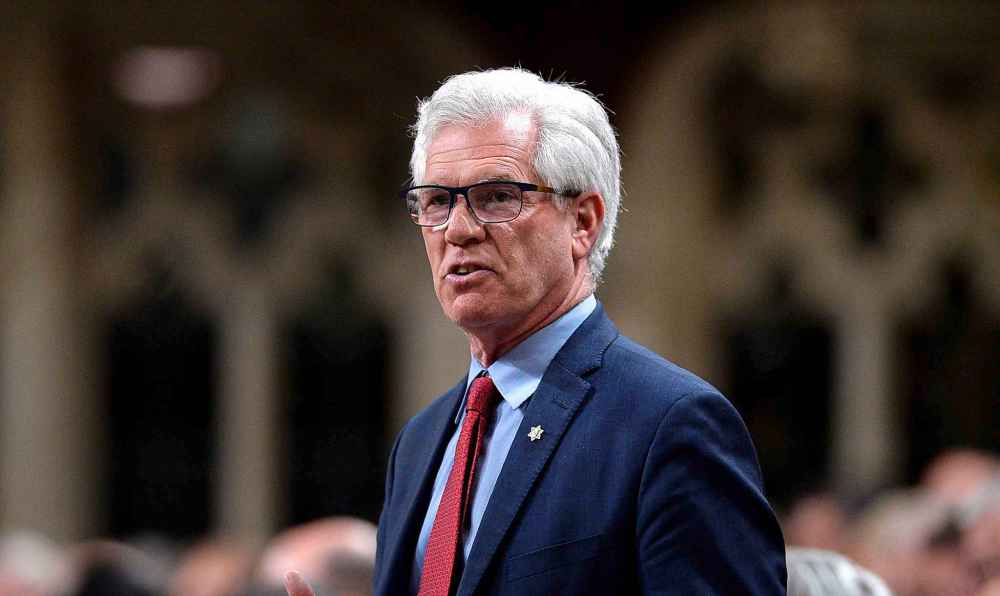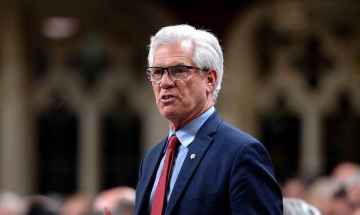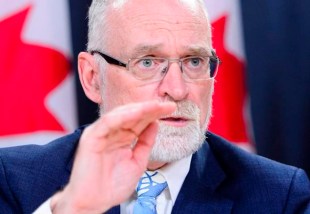Pipeline portfolio sees Carr shift from privatization to nationalization
Read this article for free:
or
Already have an account? Log in here »
To continue reading, please subscribe:
Monthly Digital Subscription
$0 for the first 4 weeks*
- Enjoy unlimited reading on winnipegfreepress.com
- Read the E-Edition, our digital replica newspaper
- Access News Break, our award-winning app
- Play interactive puzzles
*No charge for 4 weeks then price increases to the regular rate of $19.00 plus GST every four weeks. Offer available to new and qualified returning subscribers only. Cancel any time.
Monthly Digital Subscription
$4.75/week*
- Enjoy unlimited reading on winnipegfreepress.com
- Read the E-Edition, our digital replica newspaper
- Access News Break, our award-winning app
- Play interactive puzzles
*Billed as $19 plus GST every four weeks. Cancel any time.
To continue reading, please subscribe:
Add Free Press access to your Brandon Sun subscription for only an additional
$1 for the first 4 weeks*
*Your next subscription payment will increase by $1.00 and you will be charged $16.99 plus GST for four weeks. After four weeks, your payment will increase to $23.99 plus GST every four weeks.
Read unlimited articles for free today:
or
Already have an account? Log in here »
Hey there, time traveller!
This article was published 29/05/2018 (2758 days ago), so information in it may no longer be current.
OTTAWA — Winnipeg knows him as a proponent of business and privatization, but Jim Carr is now steering the federal government’s nationalization of the Kinder Morgan pipeline and finds himself defending a government takeover of private assets.
“This is an asset; there are revenues that will flow through the asset, and there’ll be transparency every step of the way,” Natural Resources Minister Jim Carr told reporters Tuesday.
Carr, MP for Winnipeg South Centre, led the Business Council of Manitoba from its 1998 founding until stepping down to run for federal politics. The non-partisan group advocates for Manitoba’s private sector, including asking governments to transfer programs into corporate hands when business says it can make the case for privatization.

For example, Carr suggested in 2006 that the provincial NDP government look at privatizing parts of Manitoba’s healthcare system, as part of its budget consultation.
“We don’t think that there ought to be anything that’s left off the table,” Carr told media at the time, acknowledging that changing healthcare funding is often controversial.
On Tuesday, every opposition party lambasted the Liberals for taking ownership of the pipeline. “Why is it that every time elements of our energy sector get nationalized is when there is a Trudeau in the Prime Minister’s Office?” Conservative Leader Andrew Scheer quipped in Question Period, referencing the National Energy Program of Pierre Elliott Trudeau.
NDP MP Niki Ashton said separately that it was “an abuse of public ownership” to take over a pipeline instead of supporting more carbon-efficient energy projects.
But Carr told reporters that he’s not actually nationalizing the pipeline. “You use the word nationalizing; we use the word investment, in an asset,” he said, noting that the Liberals’ plan is to temporarily own the pipeline and sell it after its expansion.
Carr also defended the Liberals’ decision to not divulge the total cost of the project. The pipeline will cost taxpayers $4.5 billion to take over, but some have estimated that construction, court cases and conservation requirements will more than double that price.
“It’s a commercially sensitive item; this is going to be put on the market,” Carr said. “Canadian taxpayers will know every penny that’s ultimately committed to the project.”
Finance Minister Bill Morneau stressed that Ottawa only intends to own the pipeline over the short term, which he believes is the only way to see the project through to completion.
“Our view is long-term that this project should be in the private sector. It has value, commercial value for a private owner. In order to get it done, we need to deal with the political uncertainty.”
Environmentalists are hoping to keep up that uncertainty, including in Winnipeg. On Wednesday afternoon, activists with both Manitoba Energy Justice Coalition and the Wilderness Committee will hand out flyers to drivers and protest the Trans Mountain project, at Grant Ave. and Stafford St. at 4:30 p.m.
dylan.robertson@freepress.mb.ca
Other voices
OTTAWA — Some of what was said Tuesday about the federal government’s plan to spend $4.5 billion to buy the Trans Mountain pipeline and all of Kinder Morgan Canada’s core assets, part of a strategy to rescue a proposed expansion of the oilsands pipeline.
”It must be built and it will be built.” — Finance Minister Bill Morneau.
”Make no mistake: this is an investment in Canada’s future.” — Morneau.
”We believe this is the best way to protect thousands of well-paying jobs and the safest and most effective way to get our resources to world markets.” –Morneau.
”The majority of Canadians support this project. The majority of Canadians understand that we are in a transition to a clean-growth century and we will not get there overnight. But we will get there.”– Natural Resources Minister Jim Carr.
”The prime minister is forcing Canadian taxpayers to pay for his failure. He has still failed to create certainty in the Canadian energy sector. And what’s worse, the prime minister is nationalizing a pipeline and he can’t tell Canadians the total cost. He would have Canadians believe that the only way to build the Trans Mountain pipeline is to use billions of taxpayer dollars, but it’s not. Four pipelines were built under the previous Conservative government without a dime of taxpayer money.” — Conservative Leader Andrew Scheer.
”Climate change leaders don’t spend $4.5 billion dollars on pipelines. We need a government with a vision that takes our future seriously.” — NDP Leader Jagmeet Singh on Twitter.
”The project was never in Canada’s national interest, but the government of Canada and the Trudeau administration got itself painted into a very tight corner by insisting it was in the national interest, insisting it must be built, insisting it would be built.” — Green party Leader Elizabeth May.
”As of today, this is the most certainty that this project has ever had. That certainty is absolutely critical.” — Alberta Premier Rachel Notley.
”The federal government has made a choice, a decision that was motivated by the decisions of a private company that gave a deadline, not to me, not to the people of British Columbia, but to someone they characterized as stakeholders. The federal government has responded and that’s their business.” — British Columbia Premier John Horgan.
—
”The decision raises some real questions … the federal government has done something out of necessity. The message is that our system here is broken and that it’s going to repel private sector investment if we don’t do something to fix it. So we need to fix it.” — Manitoba Premier Brian Pallister.
”Not only will it enable our producers to get their product safely to global markets, where they can get a fair price, but it will also create thousands of jobs in communities across Canada. Additionally, it will generate billions in economic activity.” — Canadian Chamber of Commerce.
”The project has always been in the national interest. CEPA is concerned about the implications of the government’s financial intervention for future transmission pipeline projects. We do not believe that this outcome will instill investor confidence in Canada.” — Chris Bloomer, president and CEO, Canadian Energy Pipeline Association.
”The federal government’s decision to purchase Trans Mountain is a totally reckless use of public money. It leaves Canadians on the hook for a risky pipeline that lacks a viable business case, flouts Canada’s commitment to Indigenous rights and reconciliation, and faces intractable legal, political and regulatory obstacles.” — Patrick DeRochie of Environmental Defence.
”This is the moment in history where Justin Trudeau has revealed that he never cared about Indigenous rights or reconciliation. The cost that they did not calculate in their $4.5 billion purchase is that Indigenous front lines will stop this pipeline.” — Will George, Tsleil-Waututh member and spokesperson for the Coast Salish Watch House.
”This decision will haunt the Trudeau government. Those of us who knocked on doors for him will not forget that he took billions of dollars from Canadian families to buy out an oil pipeline that violates Indigenous rights and our commitments on climate change. Thousands of people have committed to stand with Indigenous leaders to stop this pipeline. All hell is about to break loose in British Columbia.” — Tzeporah Berman, deputy director, Stand.earth.
—The Canadian Press








